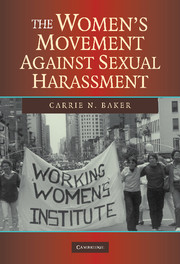Book contents
- Frontmatter
- Contents
- Figures
- Acknowledgments
- Organizational Abbreviations
- Introduction: Enter at Your Own Risk
- PART I RAISING THE ISSUE OF SEXUAL HARASSMENT
- PART II GROWTH OF A MOVEMENT AGAINST SEXUAL HARASSMENT
- PART III THE MOVEMENT'S INFLUENCE ON PUBLIC POLICY
- 6 Government Policy Develops
- 7 Fighting the Backlash: Feminist Activism in the 1980s
- 8 Legal Victory: The Supreme Court and Beyond
- Conclusion: Entering the Mainstream
- Appendix A Time Lines of Significant Events
- Appendix B Glossary of Select Cases
- Notes
- Bibliography
- Index
7 - Fighting the Backlash: Feminist Activism in the 1980s
from PART III - THE MOVEMENT'S INFLUENCE ON PUBLIC POLICY
Published online by Cambridge University Press: 14 June 2019
- Frontmatter
- Contents
- Figures
- Acknowledgments
- Organizational Abbreviations
- Introduction: Enter at Your Own Risk
- PART I RAISING THE ISSUE OF SEXUAL HARASSMENT
- PART II GROWTH OF A MOVEMENT AGAINST SEXUAL HARASSMENT
- PART III THE MOVEMENT'S INFLUENCE ON PUBLIC POLICY
- 6 Government Policy Develops
- 7 Fighting the Backlash: Feminist Activism in the 1980s
- 8 Legal Victory: The Supreme Court and Beyond
- Conclusion: Entering the Mainstream
- Appendix A Time Lines of Significant Events
- Appendix B Glossary of Select Cases
- Notes
- Bibliography
- Index
Summary
‘The entire issue is a perfect example of a minor special interest group's ability to blow up an _issue’ to a level of importance which in no way relates to the reality of the world in which we live and work.’
-38-year old plant manager for a manufacturer of industrial goods quoted in Harvard Business ReviewBy 1981, feminist activists had made significant advances in convincing the public that sexual harassment was a real and serious problem. Courts in twenty-one states and the District of Columbia had recognized that sexual harassment could give rise to a federal or state cause of action against an employer, and many states had adopted legislation, executive orders, and regulations prohibiting sexual harassment. But the newly-installed Reagan administration immediately attempted to weaken sexual harassment prohibitions and reduce the effectiveness of the EEOC. Hostile reactions arose from other quarters as well, amounting to a backlash against the anti-sexual harassment movement. While in the 1970s, most resistance to the movement came from employers defending sexual harassment suits, in the early 1980s, hostile reactions to new sexual harassment laws emerged from individuals accused of sexual harassment, conservative advocacy organizations, and even men on the left. Individuals accused of sexual harassment began to fight back more aggressively by bringing lawsuits against their accusers for defamation or their employers for wrongful termination, breach of contract, and other claims. They also filed union grievances challenging employers’ disciplinary measures imposed for sexual harassment. Employers and their advocates became even more active in resisting sexual harassment prohibitions than they had been in the 1970s. Ironically, the most outspoken critic of sexual harassment prohibitions was a woman, Phyllis Schlafly, who testified before Congress on behalf of the antifeminist group Eagle Forum. The movement that had fought for sexual harassment prohibitions now worked to diffuse this backlash, drawing on the networks they had developed in the 1970s as well as new organizations addressing the issue. The changing political and legal context, however, changed the character of the movement as the 1980s progressed.
BATTLE TO PRESERVE THE EEOC GUIDELINES
Upon taking office, the Reagan administration aggressively acted to curtail affirmative action and equal employment opportunity programs. Included within this agenda was an attempt to weaken and even abolish the EEOC sexual harassment guidelines. The first attempt to overturn the EEOC guidelines came from Utah Republican Senator Orrin Hatch.
- Type
- Chapter
- Information
- The Women's Movement against Sexual Harassment , pp. 135 - 161Publisher: Cambridge University PressPrint publication year: 2007



